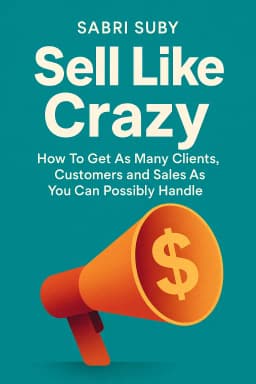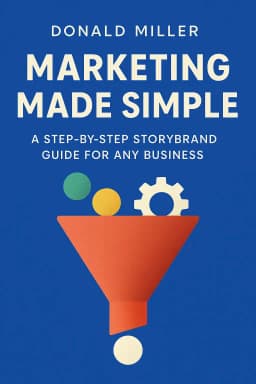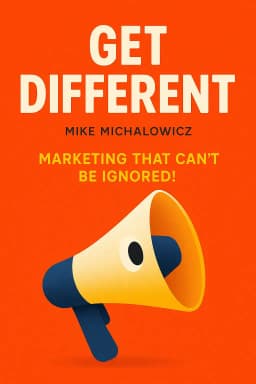
The Prospecting Paradox
Golden Hook & Introduction
SECTION
Olivia: Here’s a wild thought. The number one reason salespeople fail has nothing to do with their closing skills, their product knowledge, or even their personality. It’s an empty pipeline. And that emptiness is a choice made 30 to 90 days earlier. It’s a ghost of prospecting past. Jackson: Wow, that is a haunting image. It’s like your current bank account reflecting the work you didn't do three months ago. That’s terrifying. Olivia: It is! And that chilling reality is the entire premise of Fanatical Prospecting by Jeb Blount. Jackson: Ah, Jeb Blount. This guy isn't just an author; he's a sales acceleration guru who built his company, Sales Gravy, from the ground up and lives this stuff. The book is wildly popular, but also a bit polarizing because it champions a kind of relentless, almost obsessive work ethic. Olivia: Exactly. He argues that in an age of so-called 'easy buttons' and social selling fads, the secret to success is brutally simple and often overlooked. He says we’re all looking for a shortcut, a magic piece of software that will fill our calendars with eager buyers. Jackson: The ‘Fallacy of the Easy Button,’ as he calls it. I’ve definitely fallen for that. You buy the new tool, you get a quick surge of inbound leads, and you think, ‘I’ve cracked the code!’ Then a month later, it’s crickets, and you’re back to square one, but with less money in your pocket. Olivia: That’s the exact trap. Blount tells the story of a sales pro who does just that. They get a temporary boost, the quality of leads plummets, and soon their pipeline is bone dry. They miss their targets and can't figure out why. The resolution is the painful realization that there is no easy button. Jackson: It’s a tough pill to swallow. It feels like the universe is telling you that you have to do the hard stuff. Olivia: It is. And that leads to what Blount calls the ‘Paradox of Basics.’ He says the real secret to success is, and I’m quoting here, "A truth that is so blatantly obvious it has become impossibly invisible." Jackson: I love that. It’s like we’re all searching for a complex secret, and the answer is just… work. Consistently. But that’s not a very sexy answer, is it?
The 'Fanatical' Mindset: The Real Secret to Sales Success
SECTION
Olivia: Not at all. And that’s why the first major idea in the book is about mindset. It’s not just about working hard; it’s about becoming a ‘fanatical’ prospector. The superstars, the top 20 percent who produce 80 percent of the sales, aren't necessarily more talented. They are obsessive about keeping their pipeline full. Jackson: Okay, but ‘fanatical’ sounds exhausting. It sounds like a one-way ticket to burnout. How is that sustainable? Are these people just wired differently? Olivia: That’s the key question. Blount argues that you don't have to be born that way. He outlines seven mindsets you can cultivate. They’re things like being optimistic, competitive, confident, relentless, and thirsty for knowledge. Jackson: Relentless. That word alone makes me want to take a nap. How do you just decide to be relentless? Olivia: Well, take optimism and enthusiasm. He tells a great story about a new sales rep, Sarah, who was getting crushed by rejection. She was hesitant, her voice lacked energy, and prospects could feel it. Her manager coached her on one thing: enthusiasm. Jackson: So, fake it till you make it? Olivia: Not exactly. It was more about changing her pre-call ritual. She started her day with motivational exercises. She practiced her pitch until it sounded energetic. She focused on the positive outcomes, on how she could genuinely help the people she was calling. Jackson: And it worked? Olivia: It completely transformed her results. Prospects were more receptive. Her positive energy was contagious, and it helped her build rapport and overcome objections. Within a few months, she was a top performer. The insight is that enthusiasm isn't just a feeling; it's a behavior you can practice. Jackson: That makes sense. It’s not about pretending to be happy when you’re not. It’s about generating the energy required for the task. Like an athlete warming up before a game. You don’t just wander onto the field. Olivia: Exactly. And the book argues that top performers view themselves as elite athletes. They train their minds. They understand that their mindset drives their actions, and their actions drive their results. They don't wait for motivation to strike; they generate it through discipline. Jackson: I can see how that’s a more empowering way to look at it. It’s not about who you are, but what you do. But it still feels like a huge mountain to climb every single day. Olivia: It is. But the alternative, Blount argues, is an empty pipeline. And an empty pipeline is the number one reason for failure in sales. It’s the root of all sales evil. Jackson: The ghost of prospecting past coming back to haunt you. Olivia: Precisely. And that’s why understanding the laws that govern that pipeline is so critical.
The Three Unbreakable Laws of Prospecting
SECTION
Jackson: Okay, so it's a mindset. But how does that translate into actual results? It still feels a bit abstract. You can have the best mindset in the world, but if no one's buying, you're still broke. Olivia: This is where it gets really practical. Blount says the sales world operates on a few unbreakable laws, like physics. Whether you know them or not, they are affecting you. The first and most important is the 30-Day Rule. Jackson: The 30-Day Rule. Sounds ominous. Olivia: It is, but it’s also incredibly clarifying. The rule states: "The prospecting you do in this 30-day period will pay off for the next 90 days." Jackson: Whoa. So the work I do today doesn't even really show up for a month or more? Olivia: Exactly. He tells this perfect story about a salesperson named Greg who calls him in a panic in early March. Greg says, "Jeb, I'm in a slump! I've lost my touch, I can't close anything." He's asking for new closing techniques, some magic words. Jackson: I’ve been there. You start thinking you’ve lost your mojo. Olivia: Right. But Jeb doesn't give him closing advice. He asks a simple question: "Greg, tell me about your prospecting activity in December." And Greg admits he basically took the month off. It was the holidays, things were slow, he figured he’d catch up in January. Jackson: Oh, I see where this is going. His empty pipeline in March was a direct result of his lazy December. Olivia: Bingo. He didn't have a closing problem; he had a prospecting problem. The bill had just come due. It’s like planting a garden. You don't see the fruit the day you plant the seeds, but if you stop watering for a month, you can't be surprised when you have nothing to harvest later. Jackson: So that rollercoaster ‘feast or famine’ cycle that so many salespeople and freelancers feel… that’s not bad luck. It’s just bad math from 60 days ago! Olivia: It’s just bad math! And that ties into the second law: The Universal Law of Need. This one is pure psychology. It says, "The more you need something, the less likely it is that you will get it." Jackson: Desperation is not a good look on anyone. Olivia: It’s the worst. Prospects can smell it a mile away. When you have an empty pipeline, you get desperate. You start making bad decisions. You give away too much in negotiations, you chase unqualified leads, you sound needy on the phone. But when your pipeline is full, thanks to your consistent prospecting from 30 days ago, you’re confident. You have options. You can walk away from a bad deal. You project success, and success is attractive. Jackson: You’re playing from a position of strength, not weakness. And the third law? Olivia: The Law of Replacement. This one is simple but profound. When you close a deal, you don't just lose one opportunity from your pipeline. You lose all the potential future deals that might have come from it. So you have to be constantly adding new opportunities to the top of the funnel. If you fill your pipeline and then stop prospecting to focus on closing, you’re just setting yourself up for the next famine. Jackson: It’s a continuous cycle. You can never stop. It’s like being a shark; you have to keep swimming or you die. Olivia: A very apt, if slightly terrifying, analogy. But yes. These three laws—the 30-Day Rule, the Law of Need, and the Law of Replacement—create a system. If you ignore them, you’re at the mercy of the rollercoaster. If you master them, you control your own destiny.
The Art of Interruption
SECTION
Jackson: This all points to making more calls and sending more emails. But let's be real, Olivia, nobody likes cold calling. I hear it all the time from so-called experts: 'Cold calling is dead!' Isn't there a better way? Olivia: Blount says that's the wrong question. And this is probably the most controversial and, I think, brilliant part of the book. He argues the real issue isn't the 'cold' call; it's the 'interruption.' We are afraid to interrupt someone's day. Jackson: That’s absolutely true. I don’t want to be that guy who ruins someone’s focus. Olivia: Of course not. But Blount tells a story about a group of insurance agents. Their task was to call their own existing clients—warm leads, people who already knew and trusted them—to review their coverage. And they wouldn't do it. They made every excuse in the book. One even complained, "I didn't sign up for cold calling!" Jackson: Wow. So even with a warm lead, the fear was still there. It really is about the interruption. Olivia: It’s 100% about the interruption. And Blount’s point is that if you want to succeed in sales, you must be willing to strategically interrupt prospects. The key is to do it with a balanced methodology. Don't just cold call. Use the phone, use email, use social selling, use in-person visits. Diversify your approach, just like a financial advisor tells you to diversify your portfolio. Don't put all your eggs in one basket. Jackson: So how do you interrupt without being a jerk? That’s the million-dollar question. Olivia: It comes down to your objective and your message. The book stresses that your prospecting message has one purpose and one purpose only: to quickly persuade your prospect to give you their time. You are not selling your product. You are not selling your company. You are selling the next five minutes. Jackson: That’s a powerful reframe. So all those salespeople who launch into a monologue about how their company is 'number one' and their product is 'revolutionary' are getting it all wrong. Olivia: Completely wrong. Blount says prospects meet with you for their reasons, not yours. Your message has to be simple, direct, relevant, and focused on them. It should demonstrate that you have a reason to believe you can solve a problem they might have. Jackson: Which means you have to do your homework. You can’t just dial for dollars with a generic script. Olivia: You can’t. And that’s why he says your CRM—your customer relationship management software—is your most important sales tool. It’s not a data-entry chore; it’s your gold mine. A well-managed database allows you to make your interruptions relevant and valuable. You’re not just a random interruption; you’re a potentially helpful one. Jackson: So the fanatical mindset gives you the will, the three laws give you the strategy, and the art of interruption gives you the skill. It all fits together. Olivia: It’s a complete system. And it’s built on a foundation of radical ownership.
Synthesis & Takeaways
SECTION
Jackson: It’s a lot to take in, but when you lay it out like that, it feels less like a series of disconnected sales hacks and more like a coherent philosophy. Olivia: Exactly. Ultimately, Blount's message is about taking radical ownership. Your success isn't in your manager's hands, or in some new software, or in the economy. It's in the disciplined, daily actions you take, especially when you don't feel like it. It’s about understanding that you are the CEO of 'You, Inc.' Jackson: That’s both incredibly empowering and slightly terrifying. There are no excuses. If your pipeline is empty, it's on you. Olivia: It’s on you. But the good news is, the solution is also on you. You don’t have to wait for permission or for conditions to be perfect. You can start filling your pipeline right now. Jackson: He has that killer line near the end of the book, which he says are the eleven words that changed his life. "When it is time to go home, make one more call." It’s so simple, but so powerful. Olivia: It really is. He tells these amazing stories of salespeople who were about to pack it in for the day, remembered that phrase, made one last call, and landed a massive deal. It’s the embodiment of the whole philosophy. The extra mile is where the magic happens. Jackson: It’s the difference between being average and being a superstar. That one extra push. Olivia: And it’s a discipline. Top performers don’t necessarily enjoy making that last call. They do it because they understand it’s the price of success. They pay for it in advance with hard work. Jackson: It makes you wonder, what is the 'one more call' in your own life? The small, extra effort you could make today that your future self will thank you for? Olivia: That is the only question that really matters. How bad do you want it? Jackson: A powerful way to end. This has been incredibly insightful. Olivia: This is Aibrary, signing off.









